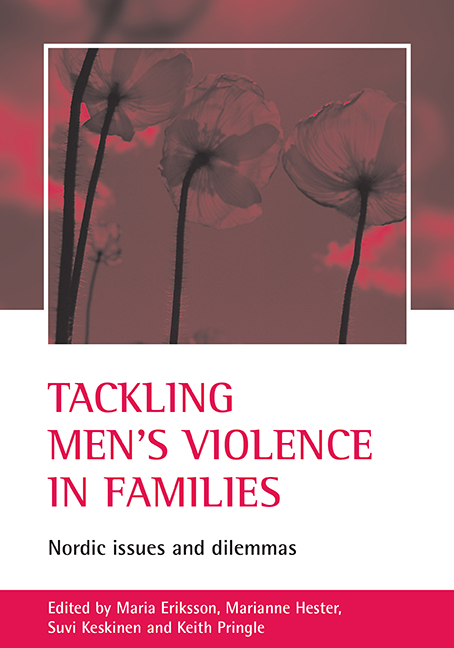Book contents
- Frontmatter
- Contents
- List of tables and figures
- Acknowledgements
- Notes on contributors
- one Introduction: Nordic issues and dilemmas
- two Children, abuse and parental contact in Denmark
- three Commitments and contradictions: linking violence, parenthood and professionalism
- four “Talking feels like you wouldn’t love Dad anymore”: children’s emotions, close relations and domestic violence
- five Bypassing the relationship between fatherhood and violence in Finnish policy and research
- six Marching on the spot? Dealing with violence against women in Norway
- seven Children’s peace? The possibility of protecting children by means of criminal law and family law
- eight A visible or invisible child? Professionals’ approaches to children whose father is violent towards their mother
- nine “Take my father away from home”: children growing up in the proximity of violence
- ten Neglected issues in Swedish child protection policy and practice: age, ethnicity and gender
- eleven Tackling men’s violence in families: lessons for the UK
- References
- Index
four - “Talking feels like you wouldn’t love Dad anymore”: children’s emotions, close relations and domestic violence
Published online by Cambridge University Press: 20 January 2022
- Frontmatter
- Contents
- List of tables and figures
- Acknowledgements
- Notes on contributors
- one Introduction: Nordic issues and dilemmas
- two Children, abuse and parental contact in Denmark
- three Commitments and contradictions: linking violence, parenthood and professionalism
- four “Talking feels like you wouldn’t love Dad anymore”: children’s emotions, close relations and domestic violence
- five Bypassing the relationship between fatherhood and violence in Finnish policy and research
- six Marching on the spot? Dealing with violence against women in Norway
- seven Children’s peace? The possibility of protecting children by means of criminal law and family law
- eight A visible or invisible child? Professionals’ approaches to children whose father is violent towards their mother
- nine “Take my father away from home”: children growing up in the proximity of violence
- ten Neglected issues in Swedish child protection policy and practice: age, ethnicity and gender
- eleven Tackling men’s violence in families: lessons for the UK
- References
- Index
Summary
Children's emotions – as described by children themselves – have not been very widely portrayed in social scientific research on family and close relationships in general, or in literature on violence in familial relationships or child abuse in particular. This chapter attempts to capture the way children exposed to violence in their own homes construct emotions related to familial relationships, especially the emotions connected to the violent father. I am interested in how and with what words children speak of their emotions during the process of recovering from violence, in situations where children's workers at shelters, specialised in helping children exposed to violence, make space for these children's ‘emotion work’ (Hochschild, 1983). My examination is theoretically and methodologically anchored in the interest within childhood sociology in highlighting the world from the children's perspective, through the children's own way of assigning meanings.
The data are derived from treatment encounters with children in Finnish shelters of the Federation of Mother and Child Homes and Shelters, and from interviews conducted with the children approximately a year after the close of the helping period. In examining the data, I concentrate on the ‘emotion talk’ of children who have experienced severe violence against themselves and their mothers, but who are nevertheless attached to their violent father. I place the children's emotions in a dialogue with the recent sociological debate on ‘the new family’ and close relationships and, more particularly, with research on children exposed to violence at home/child abuse. Through the non-encounters and gaps between these two discourses, I explore a question closely linked to emotions, the question of morals and power and their links to the social order.
Children's emotions as a challenge to social scientific Research
Children's emotions have received little attention in social scientific literature in general (Mason and Falloon, 2001). There is very little research, for example, on children's emotions towards people with whom they share a close relationship (Hughes and Dunn, 2002). Even though the thesis on the increased significance of emotions has attracted plenty of attention in recent sociological debate on family and close relationships in general, children have been neglected in the argumentation or, at most, have been seen as the objects of adults’ emotions.
- Type
- Chapter
- Information
- Tackling Men's Violence in FamiliesNordic Issues and Dilemmas, pp. 49 - 66Publisher: Bristol University PressPrint publication year: 2005
- 2
- Cited by



